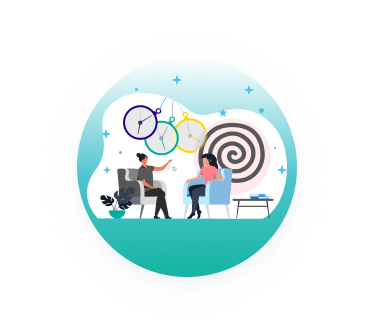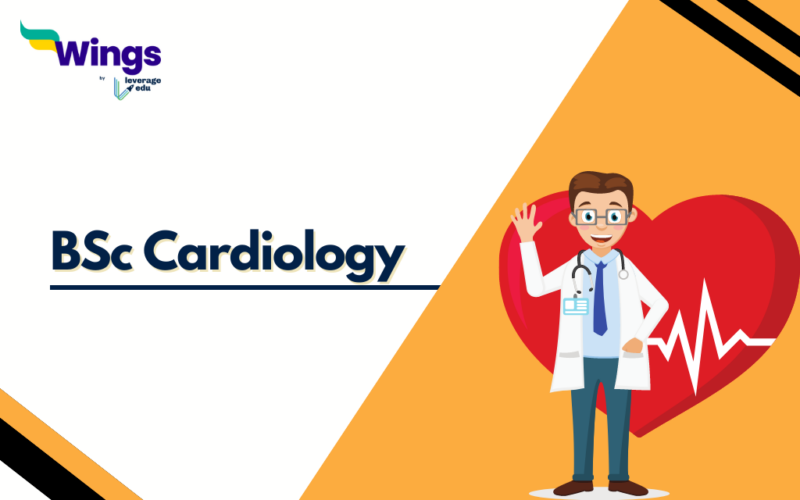The human heart is one of the most complex body parts to study. Doctors who study the functioning and structure of the human heart are called Cardiologists. Cardiology is a medical branch of internal medicine that deals with diagnosing and subsequent treatment of various heart conditions such as coronary artery disease, heart failure, congenital heart defects, valvular disease, electrophysiology, etc. BSc Cardiology is one of the most popular courses in India and abroad. It has been specially designed in such a way so that students can be trained to take care of patients suffering from cardiopulmonary diseases.
| Course | BSc Cardiology/BSc Cardiovascular Technology |
| Education Level | Undergraduate |
| Duration | 3-4 years |
| Basic Eligibility | 10+2 in Science |
| Scope | Government and Private Hospitals, Research Labs, etc. |
| Work Profiles | Sonographer, Cardiovascular Technologist, etc. |
| Salary in India | INR 3-30 Lakhs per annum |
This Blog Includes:
What is BSc Cardiology?
BSc Cardiology is a 3-year undergraduate degree in the allied specialisation in Medicine. It is also offered as BSc Cardiac Technology and prepares students to operate cardiovascular technologies and equipment to assist doctors during cardiovascular testing. Furthermore, you will carry out tasks that do not require extensive medical training but can help a doctor in numerous ways.
Also Read: BSc Courses After 12th Science
Responsibilities of a Cardiology Technician
As a Cardiology Technician, you will be handling the analysis of tests and working on medical reports. BSc Cardiology prepares you in:
- Taking care of patients suffering from cardiovascular diseases.
- Testing patients for any symptoms of heart problems.
- Applying basic as well as advanced life support skills.
- Learning the usage and maintenance of medical equipment as well as machines valuable to this branch of medicine.
- Catheter insertion and usage of pacemakers in any kind of clinical setting.
- Learning the invasive emergency procedures that are crucial for saving someone’s life.
- Observation of the correct method of performing the cardiac procedure before the application of practical skills.
- Studying as well as understanding cardiac-related procedures.
Eligibility Requirements
Mentioned below are the eligibility criteria for pursuing BSc Cardiology or BSc Cardiac Technology:
- This BSc degree requires the applicant to complete their 10+2 from a recognised educational board in the science stream.
- The major subjects you should have studied should include Biology, Physics, Chemistry [BiPC subjects] and English as these subjects are compulsory for the course.
- You need a minimum aggregate of 55% in your 10+2 to qualify for this degree. However, there might be specific eligibility criteria for different institutes offering the course.
Eligibility Requirements in India
- To pursue BSc Cardiology in India, you need to qualify for the entrance test in the university/college you are applying to.
- You do not need to qualify for the NEET exam to pursue BSc Cardiology or BSc Cardiovascular Technology.
Also Read: BSc Courses: Eligibility, Top Universities, Advantages
Abroad
To apply for a BSc degree in Cardiovascular Technology at a university abroad, you need to fulfil these requirements:
- Submit your class 12 mark sheets
- Statement of Purpose (SOP)
- Letter of Recommendation (LOR)
- English language proficiency tests like IELTS/TOEFL
- Any other document specified by the university
- SAT/ACT might also be required
BSc Cardiology Syllabus
Here is an overview of BSc Cardiology syllabus and subjects for 2024:
BSc Cardiology First Year Syllabus
- Basic Anatomy
- Microbiology
- Physical Anatomy
- Physiology
- Biochemistry
BSc Cardiology Second Year Syllabus
- Advanced Electrocardiography
- Echocardiography
- Introduction to Cardiac Technology
- Applied Pharmacology
- Exercise Stress Testing and ECG Recording
BSc Cardiology Third Year Syllabus
- Cardiac Catheterization
- Applied Cardiac Care Technology
- Clinical Cardiac Care Technology
BSc Cardiology Colleges
Since Cardiology is a specialisation of Medical Science, it is generally offered at the postgraduate level for those who have completed their bachelor’s degree in Medicine and want to gain a specialisation. There are numerous universities and medical colleges across the globe that also offer Cardiology and its related specialisation at the bachelor’s level. There is a wide range of BSc Cardiology technology government colleges in India and you can also choose from varied private medical schools as well. Here are the major BSc Cardiology colleges in India:
Top Colleges in India
Tabulated below is a list of colleges/universities offering the BSc Cardiology or BSc Cardiac Technology in India:
| Name of College/University | Location |
| Christian Medical College | Vellore, Tamil Nadu |
| JKK Natrajah Dental College and Hospital | Tamil Nadu |
| SRM Institute of Technology | Kanchipuram, Tamil Nadu |
| Sree Balaji Medical College and Hospital | Chennai, Tamil Nadu |
| Dr M.G.R Educational Research Institute | Chennai, Tamil Nadu |
| JIPMER | Puducherry, Tamil Nadu |
| Frontline Lifeline Hospital | Chennai, Tamil Nadu |
| Vinayaka Missions University | Salem, Tamil Nadu |
| M.M.M College of Health Sciences | Chennai, Tamil Nadu |
| Christian Medical College | Vellore, Tamil Nadu |
| Sri Jay Deva Institute of Cardiovascular Sciences and Research | Mysore, Tamil Nadu |
| Rajiv Gandhi University of Health Sciences | Bangalore, Karnataka |
| Sri Venkateswara Institute of Medical Sciences | Tirupati, Andhra Pradesh |
| Global University | Saharanpur, Uttar Pradesh |
| Maharana Pratap Group of Institutions | Kanpur, Uttar Pradesh |
| Chandigarh University | Chandigarh, Punjab |
| AJ Institute of Medical Science and Research Centre | Mangalore, Karnataka |
| Yenpoya University | Mangalore, Karnataka |
| Rajiv Gandhi Paramedical Institute | New Delhi |
| Geetanjali Medical College and Hospital | Udaipur, Rajasthan |
| MGMIHS | Mumbai, Maharashtra |
| KLE University | Belgaum, Karnataka |
Top Universities in Abroad
Here is a comprehensive table enlisting top universities in the world offering course variants for BSc Cardiology which you must explore:
| University | BSc Cardiology Courses |
| University of Leeds | BSc (Hons) Healthcare Science (Cardiac Physiology) |
| University of Southampton | BSc (Hons) Healthcare Science (Cardiac Physiology) BSc Healthcare Science (Cardiovascular and Respiratory and Sleep Science) |
| Middlesex University | BSc (Hons) Healthcare Science (Cardiac Physiology) Bachelor’s in Medical Physiology (Cardiovascular Science) |
| University of Wolverhampton | BSc (Hons) Healthcare Science (Cardiac Physiology) |
| Nova Southeastern University | BSc Cardiovascular Sonography |
| Massachusetts College of Pharmacy and Health Sciences | BSc in Diagnostic Medical Sonography – Echocardiography |
Jobs After BSc Cardiac Technology
After completing BSc Cardiology or any of its course variants, graduates can explore a wide range of career prospects in Medicine and Surgery. Further, many of those who complete a bachelor’s degree in Cardiology prefer to combine it with a master’s degree to gain expertise as well as clinical training. The main specialities for building a career in Cardiology are:
- Non-Invasive Cardiology
- Vascular Technology
- Echocardiography
- Invasive Cardiology
- Interventional Cardiology
- Surgery
- Electrophysiologist Cardiology
Here are the major career opportunities one can choose from these different specialities after completing graduation in Cardiology:
- Cardiologist
- Cardiac Surgeon (Cardiothoracic Surgeon)
- Clinical Nurse Specialist in Cardiology
- Electrophysiologist Cardiologist
- Cardiovascular Technologist
- Medical Sonographer
- Dialysis Technician
- Nephrologist Technician
Salary After BSc Cardiology or BSc Cardiac Technology
The average salary of BSc Cardiology graduates is generally 40,000-50,000 INR per month and can vary as per the hospital or health centre you are working with.
Scope of BSc Cardiology in India and Abroad
BSc Cardiology trains you for entry-level technician roles in the field of medicine but if you want to become a doctor after completing your Bachelor of Science in Cardiology or Cardiac Technology, you will have to pursue higher studies with an MSc degree and then an MD in Cardiology. To become a Cardiologist, you need a higher-level qualification like an MSc in Cardiology combined with a Master of Surgery or MD in a specialisation of Cardiology. Here are the top MSc Cardiology and DM Cardiology Colleges in India:
- Manipal University, Manipal
- DY Patil University, Mumbai
- Parul University, Vadodara
- AIIMS, New Delhi
- Institute of Medical Sciences, Benaras Hindu University, Varanasi
- Dayanand Medical College and Hospital, Ludhiana
- SRM Medical College, Hospital and Research Centre, Chennai
Check out the top universities and colleges to study masters or MD in Cardiology abroad:
- University of Hertfordshire, UK
- Brighton and Sussex Medical School, UK
- National University of Ireland, Galway
- Trinity College Dublin
- Middlesex University London
FAQs
NEET is not required to pursue BSc Cardiology and the basic eligibility criteria you need to fulfil is 10+2 in science stream with Physics, Chemistry, Biology and English as core subjects.
Many universities and colleges have their own entrance exams for BSc Cardiology like Delhi University Entrance Exam, JIPMER Pondicherry, SSUTM Bhopal, etc.
You can explore a wide range of postgraduate degree courses in Medicine and Surgery after BSc Cardiology like an MD in Cardiology or Cardiac Technology to attain a higher-level qualification in this field.
A cardiologist is a specialized doctor who treats diseases in the cardiovascular system.
A Cardiologist treats the following diseases:
1. Hypertension
2. Arrhythmias
3. Congenital Heart Disease
4. High Blood Cholesterol and Triglycerides
5. Congestive Heart Disease
6. Atherosclerosis
7. Atrial Fibrillation
8. Coronary Heart Disease
Related Articles
Hence, BSc Cardiology brings you to explore the medical science of the heart and cardiac-related diseases. There are numerous universities around the world offering this course to equip you with the desired skills and a complete understanding of handling heart diseases. If you are confused about whether this course is an ideal one for you or not, Leverage Edu experts can help you in discovering your passion and talents to choose the right course in medical science that aligns with your interests.
-
IS B.Sc cardiology and B.Sc Cardiac care technology same?
-
Hi Pratik,
Some courses belong to the same domain such as BSc Cardiology and BSc Cardiac Care Tchnology but they may differ in terms of their orientation. To know which course will suit you best, connect with our experts at 1800572000.
-
-
Sir/Madam
Can I do cardiology with my CBSE Mark
I got 70.2 %-
Hi Pape,
To know the exact eligibility criteria for this course, get in touch with our experts 1800572000.
-

 One app for all your study abroad needs
One app for all your study abroad needs

























 45,000+ students realised their study abroad dream with us. Take the first step today.
45,000+ students realised their study abroad dream with us. Take the first step today.


25 comments
IS B.Sc cardiology and B.Sc Cardiac care technology same?
Hi Pratik,
Some courses belong to the same domain such as BSc Cardiology and BSc Cardiac Care Tchnology but they may differ in terms of their orientation. To know which course will suit you best, connect with our experts at 1800572000.
Sir/Madam
Can I do cardiology with my CBSE Mark
I got 70.2 %
Hi Pape,
To know the exact eligibility criteria for this course, get in touch with our experts 1800572000.
BSc Cardiology
What is the fee of BSC Cardiology for 3 years
Hi Hima,
The overall tuition fee for BSc Cardiology will depend on the institution you choose to pursue it from. To know the estimated course fee for the university/college of your choice, get in touch with our Leverage Edu experts.
Does a nutritionist graduate who had also diploma in medicine eligible to persue masters in cardiology…
Hi Crispin,
To know about the exact eligibility criteria, get in touch with our experts today through free e-meeting. Book yours today!
What is the fee of B.sc cardiology for 3 years?
What is the fee of B.sc cardiology for 3years
Hi Sai Priya,
The overall tuition fee for BSc Cardiology will depend on the institution you choose to pursue it from. To know the estimated course fee for the university/college of your choice, get in touch with our Leverage Edu experts.
I need some information please
Hi Annu!
Here are some articles for you –
https://leverageedu.com/blog/cardiologist/
https://leverageedu.com/blog/msc-cardiology/
This information is very beneficial for me
finally i get some basic information from this
Thankfully too u
thanks for reading.
I want know details of this course
Hi, Sandeep!
All the relevant details are mentioned in the given article. If you still need more help contact us at 1800 57 2000 or directly mail your requirements on [email protected].
Can we do msc cardiology after completing bsc cardiology? If so, is their any scope doing that? And what will be the career options after that?
Hi, Varshith!
Yes, you can pursue MSc Cardiology after completing BSc Cardiology. All you need to be aware of is the eligibility requirements.
Demand for becoming a cardiologist is on the verge of increasing. As per the health affairs report, career opportunities will increase by 18% on annual basis by 2025.
Look for the following career options afters MSc Cardiology:
Cardiovascular Surgeon
Biologists
Cardiac Physiologists
Cardiologist
Electrophysiologist and many more!
Here is a blog for your better understanding: MSc Cardiology
We hope this helps. If you are deciding to study abroad, give us a call on 1800 57 2000 and we will guide you through every step. Talk to our mentors and begin with your study abroad journey.
Hi, Varshith!
Yes, you can pursue MSc Cardiology after completing BSc Cardiology. All you need to be aware of is the eligibility requirements.
Demand for becoming a cardiologist is on the verge of increasing. As per the health affairs report, career opportunities will increase by 18% on annual basis by 2025
Look for the following career options afters MSc Cardiology:
Cardiovascular Surgeon
Biologists
Cardiac Physiologists
Cardiologist
Electrophysiologist and many more!
Here is a blog for your better understanding: MSc Cardiology
We hope this helps. If you are deciding to study abroad, give us a call on 1800 57 2000 and we will guide you through every step. Talk to our mentors and begin with your study abroad journey.
What can we study after bsc cardiology??We can do Msc cardiology afer bsc cardiology or we should do mbbs course for doing msc cardiology??
Hello,
You can pursue MD in Cardiology or MSc Cardiology after completing a BSc in Cardiology. Also, MBBS is not a requirement for pursuing MSc in Cardiology. Additionally, you can read more about MSc in Cardiology in this blog- https://leverageedu.com/blog/msc-cardiology/.
What is the scope of it?? Can I get job easily after it?? Is it worth doing in India?
Can we become a cardiac surgeon after completing masters in bsc cardiology?